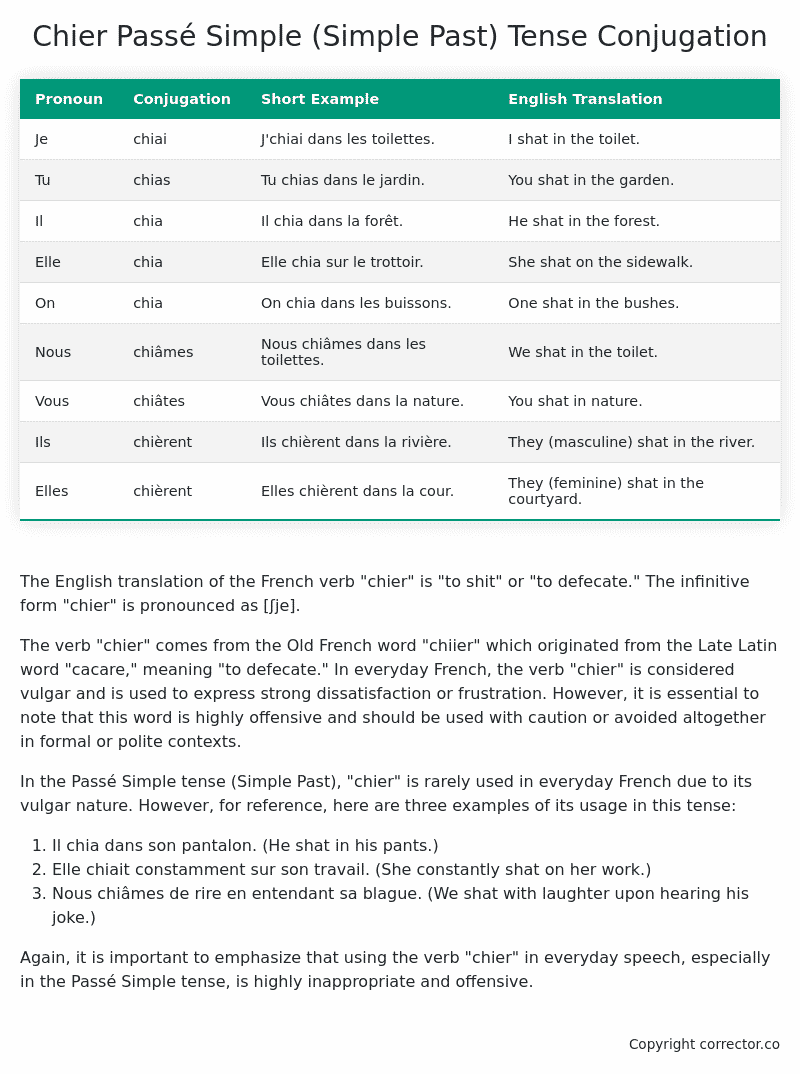Passé Simple (Simple Past) Tense Conjugation of the French Verb chier
Introduction to the verb chier
The English translation of the French verb “chier” is “to shit” or “to defecate.” The infinitive form “chier” is pronounced as [ʃje].
The verb “chier” comes from the Old French word “chiier” which originated from the Late Latin word “cacare,” meaning “to defecate.” In everyday French, the verb “chier” is considered vulgar and is used to express strong dissatisfaction or frustration. However, it is essential to note that this word is highly offensive and should be used with caution or avoided altogether in formal or polite contexts.
In the Passé Simple tense (Simple Past), “chier” is rarely used in everyday French due to its vulgar nature. However, for reference, here are three examples of its usage in this tense:
- Il chia dans son pantalon.
(He shat in his pants.) - Elle chiait constamment sur son travail.
(She constantly shat on her work.) - Nous chiâmes de rire en entendant sa blague.
(We shat with laughter upon hearing his joke.)
Again, it is important to emphasize that using the verb “chier” in everyday speech, especially in the Passé Simple tense, is highly inappropriate and offensive.
Table of the Passé Simple (Simple Past) Tense Conjugation of chier
| Pronoun | Conjugation | Short Example | English Translation |
|---|---|---|---|
| Je | chiai | J’chiai dans les toilettes. | I shat in the toilet. |
| Tu | chias | Tu chias dans le jardin. | You shat in the garden. |
| Il | chia | Il chia dans la forêt. | He shat in the forest. |
| Elle | chia | Elle chia sur le trottoir. | She shat on the sidewalk. |
| On | chia | On chia dans les buissons. | One shat in the bushes. |
| Nous | chiâmes | Nous chiâmes dans les toilettes. | We shat in the toilet. |
| Vous | chiâtes | Vous chiâtes dans la nature. | You shat in nature. |
| Ils | chièrent | Ils chièrent dans la rivière. | They (masculine) shat in the river. |
| Elles | chièrent | Elles chièrent dans la cour. | They (feminine) shat in the courtyard. |
Other Conjugations for Chier.
Le Present (Present Tense) Conjugation of the French Verb chier
Imparfait (Imperfect) Tense Conjugation of the French Verb chier
Passé Simple (Simple Past) Tense Conjugation of the French Verb chier (You’re reading it right now!)
Passé Composé (Present Perfect) Tense Conjugation of the French Verb chier
Futur Simple (Simple Future) Tense Conjugation of the French Verb chier
Futur Proche (Near Future) Tense Conjugation of the French Verb chier
Plus-que-parfait (Pluperfect) Tense Conjugation of the French Verb chier
Passé Antérieur (Past Anterior) Tense Conjugation of the French Verb chier
Futur Antérieur (Future Anterior) Tense Conjugation of the French Verb chier
Subjonctif Présent (Subjunctive Present) Tense Conjugation of the French Verb chier
Subjonctif Passé (Subjunctive Past) Tense Conjugation of the French Verb chier
Subjonctif Imparfait (Subjunctive Imperfect) Tense Conjugation of the French Verb chier
Subjonctif Plus-que-parfait (Subjunctive Pluperfect) Tense Conjugation of the French Verb chier
Conditionnel Présent (Conditional Present) Tense Conjugation of the French Verb chier
Conditionnel Passé (Conditional Past) Tense Conjugation of the French Verb chier
Conditionnel Passé II (Conditional Past II) Tense Conjugation of the French Verb chier
L’impératif Présent (Imperative Present) Tense Conjugation of the French Verb chier
L’impératif Passé (Imperative Past) Tense Conjugation of the French Verb chier
L’infinitif Présent (Infinitive Present) Tense Conjugation of the French Verb chier
L’infinitif Passé (Infinitive Past) Tense Conjugation of the French Verb chier
Le Participe Présent (Present Participle) Tense Conjugation of the French Verb chier
Le Participe Passé (Past Participle) Tense Conjugation of the French Verb chier
Struggling with French verbs or the language in general? Why not use our free French Grammar Checker – no registration required!
Get a FREE Download Study Sheet of this Conjugation 🔥
Simply right click the image below, click “save image” and get your free reference for the chier Passé Simple tense conjugation!

Chier – About the French Passé Simple (Simple Past) Tense
Formation
Usage
Narration
Historical Context
Interactions with other tenses
Passé Composé
Imparfait
Conditional and Subjunctive
Summary
I hope you enjoyed this article on the verb chier. Still in a learning mood? Check out another TOTALLY random French verb conjugation!


